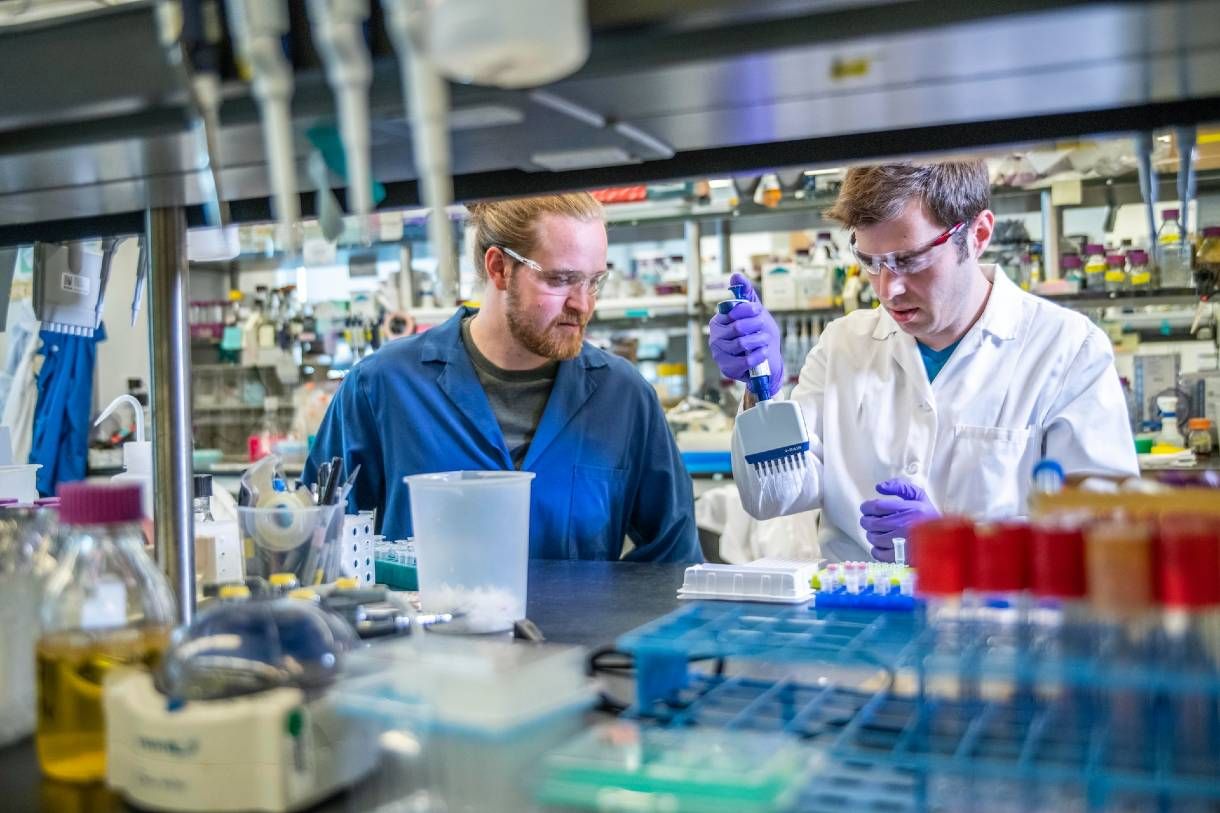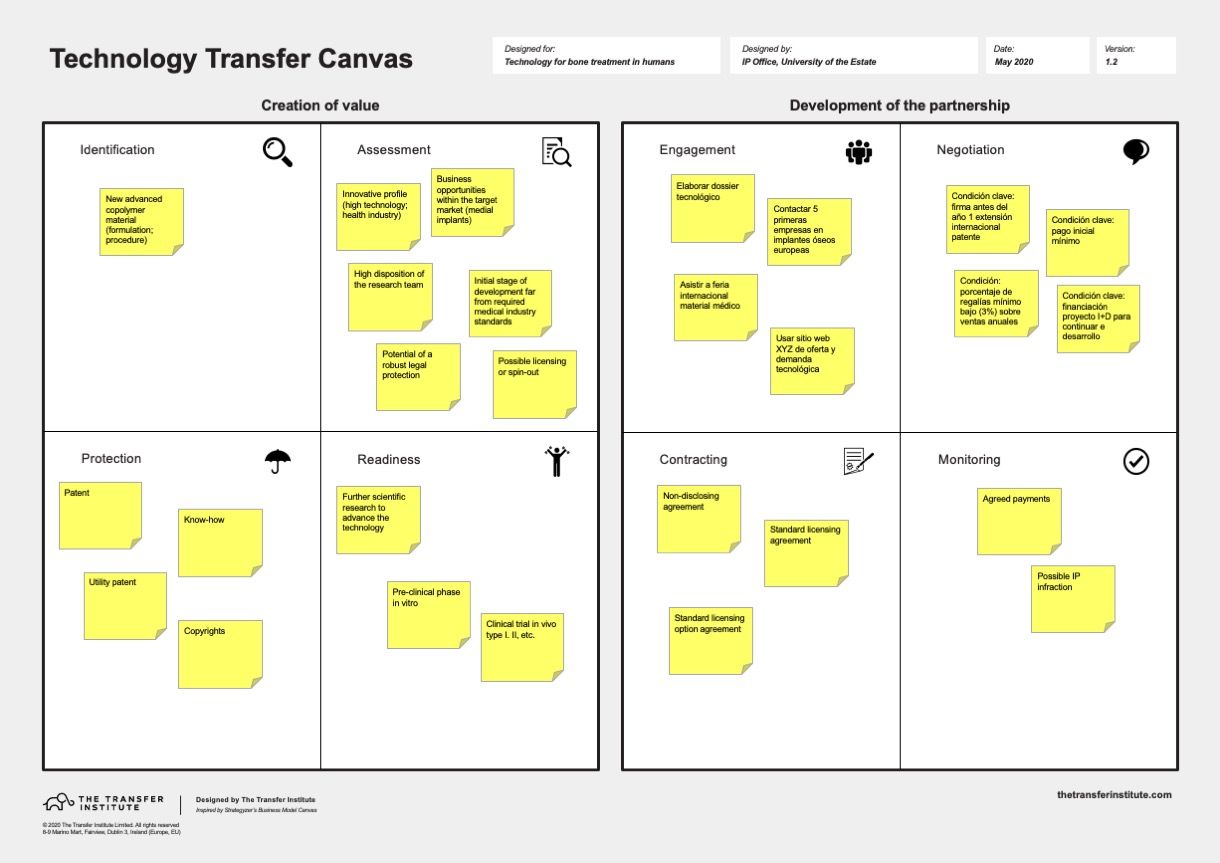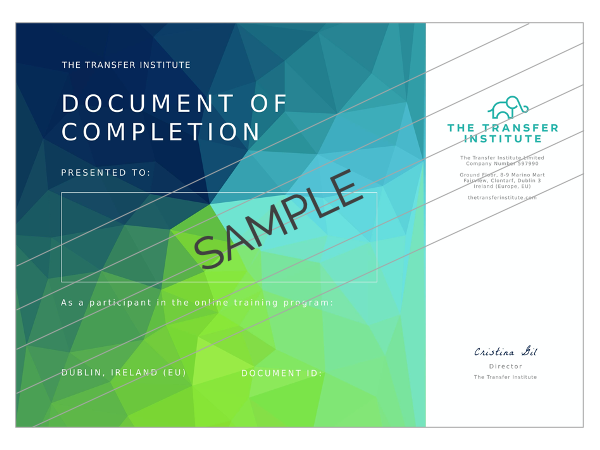Technology transfer and commercialisation - Online course

Learn to formulate an action plan to transform inventions into innovations and get an overview of the technology transfer and patent commercialization process.
-
Delivery:
Self-paced, online course through the internet
Participants learn at their own schedule -
Dates:Start at any time
-
Length:
6 weeks
-
Effort:
3-5 hours/week
-
Level:
Beginner - intermediate
-
Language:
English
Online, self-paced
Online course through the internet: start at anytime and learn at your own pace.
Practice-doing
Applied learning based on a real project supported by case-studies and readings.
Participant-driven
Course overview
Why this online course
Practitioners that are involved in technology transfer and intellectual property (IP) commercialization operations need to know the process steps and critical factors that lead to transform early technology opportunities in the form of laboratory inventions into successful innovations available in the market.
Learning objectives
- Learn how to formulate an action plan to transfer a technology (IP) from lab to market.
- Get a comprehensive overview of the technology transfer process.
- Know the fundamentals of technology identification, assessment, protection and maturation, as well as partner engagement, negotiation, contracting and monitoring.
Competences to acquire
- Critical thinking. Ability to analyze situations and evaluate data, in the context of technology transfer and commercialization.
- Decision-making. Capacity to establish an appropriate line of action in problem-solving, particularly in applying the technology transfer process to a given situation.
- Initiative. Vision of opportunities and action-oriented regarding a technology transfer strategy.
- Planning. Ability to effectively carry out an appropriate action plan in the use of technology transfer concepts.
- Teamwork. Willingness to participate as an integrated member in a working group on technology transfer and commercialization.
Target audience
Requirements
No formal prerequisites in terms of qualifications, background, previous experience nor geographical location are required to enroll in this online course.
Course outline
Lesson 1. Introduction to technology transfer
- Concept of technology transfer
- Characterizing features of technology transfer
- Technology transfer mechanisms
- Motivations for technology transfer
- Benefits of technology transfer
- Law framework for technology transfer
- Technology transfer offices
Lesson 2. The technology transfer process
- Overview of the technology transfer process
- First stage: create value to innovate
- Second stage: develop the partnership
Lesson 3. Technology identification
- The technology identification phase
- Results of R&D activity
- Invention disclosure
- Interviewing researchers
Lesson 4. Technology assessment
- The technology assessment phase
- Factors to make the right decisions
- Value proposition of the technology
- Market analysis
- Time of market entry
- Protection strength
- Capacity of the research team
- Pathways to transfer technology
- Partners in technology transfer
- Technology transfer strategic plan
- Market validation
Lesson 5. Technology protection
- The technology protection phase
- Overview of intellectual property rights
- Getting the technology protected by patenting
- Checking patentability
- Filing the patent
- The patenting process in a nutshell
Lesson 6. Technology readiness
- The technology readiness phase
- Bridging the gap towards the market
- Development and proof of concept
- Required partners
Lesson 7. Partner engagement
- The engagement phase
- The process for locating technology partners
- The engagement process with technology partners
Lesson 8. Deal-making and negotiation
- The deal-making and negotiation phase
- Overview of the negotiation process
- Preparing the negotiation process
Lesson 9. Contracting
- The contracting phase
- Overview of technology transfer contracts
- License agreement
- Structure of a patent license agreement
- Spin-offs (startup creation)
Lesson 10. Process monitoring
- The monitoring phase
- Technology transfer implementation
- The technology package to transfer
- Monitoring actions
- Disputes in technology transfer
Course practice
Applied learning project
- Commercialization of a new photobioreactor technology for microalgae cultivation
Case-studies
- Identification of technology: research project on bone treatment
- Assessment of technology: research project on bone treatment
- Identification of technology: research project on bone treatment
- Protection of technology: research project on bone treatment
- Maturation of technology: research project on bone treatment
- Deal making and negotiation: research project on bone treatment
Analytical tools
- The Technology Transfer Canvas
- Invention disclosure forms
- Conversation with researchers to identify inventions / script of interview
- Information available to identify inventions
- Technology assessment dashboard
- Technology Readiness Levels (TRLs)
- Preparation of technology brochure
- Preparation of negotiation on technology transfer
- Templates and models for technology transfer agreements
Readings
- Carbon Nanotechnology Lowers Cost of Hydrogen Fuel Cell
- Dynapower and Raychem Announce Technology Transfer Agreement
- Patent Licensing: up to $1.18 Trillion contributed to U.S. Economy Since 1996
- The technology transfer process in some universities
- Navigating technology transfer issues
- Improving invention disclosure quality
- INNOVA Program, financing proof-of-concept projects
- Reinventing tech transfer
- Rive Technology, a spinoff to catalyst the industry
Weekly routine
Week 1. The process of technology transfer
GOAL | Weekly learning goal | Learn the introductory concepts of technology transfer and the key elements of the technology transfer process |
LESSON | Introduction to technology transfer |
|
READING | Carbon Nanotechnology Lowers Cost of Hydrogen Fuel Cell | A real example of technology transfer from academia to industry |
READING | Patent Licensing: up to $1.18 Trillion contributed to U.S. Economy Since 1996 | Academic technology transfer in the form of patent licensing benefits the economy in terms of gross industry output, gross domestic product (GDP), new companies, new products, and jobs. |
LESSON | The technology transfer process |
|
READING | The Technology Transfer Process in Some Universities | Some real examples of technology transfer process in some renowned universities worldwide |
TOOL | The Technology Transfer Canvas | Visualize the process of analyzing the transfer of a technology from laboratory to market in a certain organization |
FORUM | Interaction and discussion with course peers | Share your viewpoint about your weekly learning on the online discussion forum |
Week 2. Identification and assessment of technology
GOAL | Weekly learning goal | Identify potential innovations resulting from the R&D activity and assess them from the market perspective |
LESSON | Technology identification |
|
READING | Improving Invention Disclosure Quality | Practice-based recommendations to have better technology disclosing at universities |
CASE | Identification of Technology: IBV Research Project on Bone Treatment | IBV is a technology center that carried out an applied research project to develop an advanced copolymer material for the treatment of bone defects in human beings. IBV tries to identify the possible results obtained from the project to find technology transfer opportunities. |
TOOL | Invention Disclosure Forms | Some examples of invention disclosure forms used by renowned universities |
TOOL | Conversation with Researchers to Identify Inventions | List of topics to guide a conversation with a researcher (or research group) and identify technology transfer opportunities |
TOOL | Information Available to Identify Inventions | Template with possible resources available for collecting information to identify technology transfer opportunities |
LESSON | Technology assessment |
|
READING | Assessing IP and technology at the University of Liege | How universities assess their own technologies in practice by using already developed assessment tools |
READING | Licensing or spinout? An overview of your options | There are two main options to transfer a technology from lab to market, namely licensing and spin-out, each of them having its own pros and cons at any given case. |
CASE | Assessment of Technology: IBV Research Project on Bone Treatment | IBV is a technology center that carried out an applied research project whose main outcome is the formulation and processing conditions of the advanced material. IBV tries to assess the possibilities of its commercial exploitation. |
TOOL | Technology Assessment Dashboard | Methodology for evaluating technology from different perspectives considering relevant areas: technology profile, target market, time of entry, strength of protection, team capacity, partners, and pathways. |
TOOL | Technology Readiness Levels (TRLs) | Technology Readiness Levels (TRL) are a method of estimating technology maturity. TRL is based on a scale from 1 to 9 with 9 being the most mature technology. |
FORUM | Interaction and discussion with course peers | Share your viewpoint about your weekly learning on the online discussion forum |
Week 3. Protection and readiness of technology
GOAL | Weekly learning goal | Analyze the approach to protect a technology and the need to further develop it (proof of concept, readiness) |
LESSON | Technology protection |
|
CASE | Protection of Technology: IBV Research Project on Bone Treatment | IBV is a technology center that carried out an applied research project to develop an advanced copolymer material for the treatment of bone defects in human beings. With the outcomes of the technology assessment in mind, IBV tries to analyze the possible types of protection which may apply to the technology resulting from this research project. |
LESSON | Technology readiness |
|
READING | Bridging the technological “valley of death” | The difficulty of bridging the technological valley of death, that is the gap between academia and industry when it comes to technology transfer. |
READING | INNOVA Program: Financing Proof-of-Concept Projects | A real example of a technology proof-of-concept funding program at a university to bridge the ‘valley of death’ |
CASE | Readiness of Technology: IBV Research Project on Bone Treatment | IBV is a technology center that carried out an applied research project to develop an advanced copolymer material for the treatment of bone defects in human beings. With the outcomes of the technology assessment in mind, IBV tries to analyze the possibilities of further developing the technology to a more advanced state that will attract industry interest. |
FORUM | Interaction and discussion with course peers | Share your viewpoint about your weekly learning on the online discussion forum |
Week 4. Engagement and negotiation
GOAL | Weekly learning goal | Find the right partners to engage in the technology transfer process and define the deal to initiate a negotiation process |
LESSON | Partner engagement |
|
READING | Reinventing Tech Transfer | A real example of new ways to engage with industry at academic institutions with regards to technology transfer |
READING | Business Scouts at the University of Southern Denmark | How universities interact with industry to improve the feedback towards a better technology transfer process |
TOOL | Preparation of Technology Brochure | Template for preparing a technology document (promotional brochure) for a technology. The purpose of this document is to show information about the technology to potential customers interested in acquiring it, allowing essential details to be disclosed in order to quickly assess interest. |
LESSON | Deal-making and negotiation |
|
CASE | Deal-making and Negotiation: IBV Research Project on Bone Treatment | IBV is a technology center that carried out an applied research project to develop an advanced copolymer material for the treatment of bone defects in human beings. With the outcomes of the technology assessment in mind, IBV tries to define the roadmap to facilitate the negotiation process with a possible licensing partner. |
TOOL | Preparation of Negotiation on Technology Transfer | Template to prepare a technology transfer negotiation that may be useful to consider all relevant aspects |
FORUM | Interaction and discussion with course peers | Share your viewpoint about your weekly learning on the online discussion forum |
Week 5. The technology transfer agreement
GOAL | Weekly learning goal | Establish the key aspects/structure of the technology transfer contract and identify the monitoring actions that are needed |
LESSON | Contracting |
|
READING | Agreements: A Review of Essential Tools of IP Management | The types of major agreements that can be utilized in technology transfer as part of the relationship between public-sector research institutions and industry |
READING | University Spinoffs: What, Why, and How? | A wider understanding of university spinoffs and academic entrepreneurship from a scientific evidence perspective |
CASE | Rive Technology: A Spin-off to Improve Catalysts | Rive Technology is a start-up that commercializes an MIT-developed invention that improves catalysts used in oil refining. The case illustrates how a given situation of spin-out creation has been addressed in practice, as part of the process to transfer an invention from bench to market. |
TOOL | Templates and Models for Technology Transfer Agreements | Some templates and models for technology transfer agreements used by renowned institutions |
LESSON | Process monitoring |
|
FORUM | Interaction and discussion with course peers | Share your viewpoint about your weekly learning on the online discussion forum |
Week 6. Applied learning project
GOAL | Weekly learning goal | Apply the knowledge acquired during the course to a practical situation through the "practice by doing" approach, so an effective retention of information and learning experience can be achieved |
PROJECT | Commercialization of a new photobioreactor technology for microalgae cultivation | Imagine you are a practitioner working for a technology transfer office, whose main role is to advise scientists on commercialization of their inventions. Say that you have been provided with an invention disclosure form to communicate a new technology (“novel photobioreactor for mass cultivation of microalgae”), and you need to properly advise the inventor to move forward in technology transfer. |
FORUM | Interaction and discussion with course peers | Share your viewpoint about your weekly learning on the online discussion forum |
SURVEY | Satisfaction, learning and suggestions | Take a few minutes to answer this survey to find out your satisfaction with the course, evaluate your learning as a participant, and receive your suggestions for improvement. |
CREDENTIAL | Course completion document | Download the course completion credential (statement of completion) |
Analytical tool

Technology Transfer Canvas
Course credential

Download course syllabus
Download the PDF course brochure to know all details: objectives, competences, content, practice, recommended weekly routine, learning methodology, credentials, etc.
Preparation for certification
This course prepares for the online exam to become a Certified Professional by The Transfer Institute in this domain of business. Participants have to enroll separately in the professional certification that supplements this course. Please check out our pricing options and discounts.
The Transfer Institute learning experience
-
Mode of delivery: online, self-paced, flexible duration
-
Practice-doing approach: applied project, peers’ review, tools
-
Participant-driven learning: community of practice, facilitator
-
Educational material (lessons, case-studies, readings, tools...)
-
Course completion credential; professional certification available
-
Planning for a successfully learning experience
Pricing options
Discounts, registration, payment, invoice?
We are trusted by leading customers
University of Manchester / Imperial College London / National University of Medical Sciences Pakistan / Universidad Carlos III de Madrid / Universidad Autónoma de Baja California / Universidad de Concepción / Centro Investigación Polímeros Avanzados / CSIC / Fundación Cientifica AECC / Corfo / Onedose Pharma / Libelium
"The program systematises the approach to technology transfer and gives value by solving practical cases. I highly recommend it for all professionals involved in technology transfer"